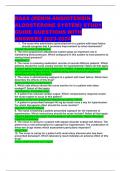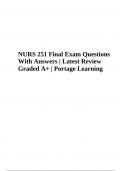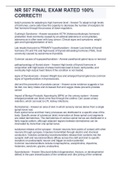Blocks binding of ang Study guides, Class notes & Summaries
Looking for the best study guides, study notes and summaries about Blocks binding of ang? On this page you'll find 4 study documents about Blocks binding of ang.
All 4 results
Sort by

-
RAAS (RENIN-ANGIOTENSIN-ALDOSTERONE SYSTEM) STUDY GUIDE QUESTIONS WITH ANSWERS 2023-2024
- Exam (elaborations) • 6 pages • 2024
-
- $20.99
- + learn more
RAAS (RENIN-ANGIOTENSIN-ALDOSTERONE SYSTEM) STUDY GUIDE QUESTIONS WITH ANSWERS 1. The nurse who administers spironolactone to a patient with heart failure should recognize that it promotes improvement by what mechanism? it blocks the action of aldosterone 2. The renin-angiotensin-aldosterone system plays an important role in maintaining blood pressure. Which compound in this system is most powerful at raising blood pressure? Angiotensin II 3. The nurse is reviewing medication records of se...

-
NURS 251 Final Exam Questions With Answers (Latest Review Graded A+ Portage Learning)
- Exam (elaborations) • 18 pages • 2023
- Available in package deal
-
- $19.49
- + learn more
NURS 251 Final Exam Questions With Answers (Latest Review Graded A+ Portage Learning). Drugs that block H2 receptors are simply called “H2 blockers 9. Pantoprazole (Protonix, Nexium, Prilosec) PPI Milk of magnesia (Tums, Maalox) Antacid Neutralize gastric acid Famotidine (Pepcid, Tagment Zantac) H2 Receptor blockers Block H2 receptors in Antacids (Gaviscon) Neutralize gastric acid 10. Carl 57-year-old male, has come to the clinic today for a standard wellness visit. The nurse asks Carl, ...

-
PATHOPHYSIOLOGY 370 FINAL EXAM STUDY GUIDE.
- Other • 57 pages • 2021
-
- $10.99
- + learn more
Chapter 1: PATHOPHYSIOLOGY 370 FINAL EXAM STUDY GUIDE 1. Etiology: study of causes or reasons for a particular injury. Idiopathic (unknown) vs Iatrogenic (unintended/unwanted medical treatment ). Risk Factor: a factor that increases the likelihood of disease. 2. Pathogenesis: development or evolution of disease from initial stimulus to ultimate expression of manifestations of the disease. 3. Clinical Manifestations: Signs (objective) vs Symptoms (subjective). 4. Stages and Clinical Course: Laten...

-
NR 507 FINAL EXAM RATED 100% CORRECT!!
- Exam (elaborations) • 23 pages • 2022
-
- $15.99
- + learn more
body's process for adapting to high hormone level To adapt to high levels of hormones, some cells have the capacity to decrease the number of receptors for that hormone through the process of down-regulation. Cushing's Syndrome excessive ACTH (Adrenocorticotropic hormone) production most commonly caused by an adrenal adenoma or a non-pituitary adenoma as is often seen with lung cancer. Clinical signs and symptoms: weight gain and hyperpigmentation of skin. Lab results that poin...

Do you wonder why so many students wear nice clothes, have money to spare and enjoy tons of free time? Well, they sell on Stuvia! Imagine your study notes being downloaded a dozen times for $15 each. Every. Single. Day. Discover all about earning on Stuvia


